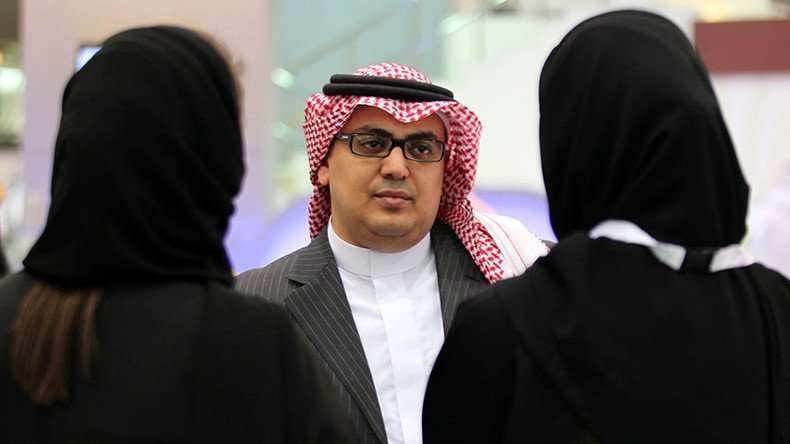Saudi Arabia’s male guardianship still limits women’s rights despite reforms – HRW report

The latest report from Human Rights Watch has revealed that obligatory male guardianship in Saudi Arabia remains a key obstacle to women’s rights. Adult women have to get permission from men to travel abroad, marry, or be freed from prison.
These rules apply from cradle to grave, as women are always regarded as legal minors in Saudi Arabia.
The 79-page report entitled “Boxed In: Women in Saudi Arabia’s Male Guardianship System” studies the formal and informal obstacles that Saudi women face daily.
The title derives from one account given by a 25-year-old Saudi woman, who said “We all have to live in the borders of the boxes our dads or husbands draw for us.”
Every Saudi woman is bound to have a male guardian, usually a father or husband, but sometimes a brother or a son. Other male relatives also have authority over women’s fates, although to a lesser extent.
The guardian makes crucial life decisions for his charge: he has the power to prohibit her from traveling abroad, working, or marrying. The woman should ask her guardian for advice on getting proper health care as well.
Women’s rights activists have repeatedly urged the Saudi authorities to change the situation, and in 2009 and 2013, Saudi Arabia did adopt steps to ease the control of the guardians.
In particular, no permission is now needed for Saudi women to work, and a law was passed criminalizing domestic abuse.
In addition, in 2013, the Saudi king at that time, Abdullah, appointed 30 women as part of the Shura Council, the country’s highest advisory body.
Last year, women were allowed to vote and run as candidates in municipal council elections for the first time.
Back in April, Saudi Arabia revealed its “Vision 2030” program, the country’s “vision for the future,” which declares the government will “continue to develop [women’s] talents, invest in their productive capabilities and enable them to… contribute to the development of our society and economy.”
However, despite these steps, Human Rights Watch experts think that the situation remains unacceptable and unfavorable to the country’s political and financial position.
“The fact that Saudi women are still forced to get a male guardian’s permission to travel, work, or do anything else is a long-standing rights violation and a barrier to the government’s plans to improve the economy. The government should do itself a favor and finally listen to the demands of half its population to be freed from the shackles of the guardianship system,” said Sarah Leah Whitson, HRW’s Middle East director, as cited in Human Rights Watch’s news release.
Women still may not apply for a passport or travel abroad without a male guardian’s approval, and often face problems when renting an apartment or filing legal claims by themselves.
At the same time, a guardian’s permission is not needed for women to work, but individual employers are allowed to demand it.
What makes the situation even graver is that women face major obstacles if they try to escape from domestic abuse or ask for help, the report found. A women’s rights activist told HRW about the vicious circle women face: a woman can flee to a shelter, but a male relative (often the same man that abused her) is required to give permission for her to be released.
A curious fact is that the guardianship experience is closely connected with social class, as Zeina, a Saudi businesswoman in her 40s, told HRW. Wealthier families tend to be more open to women working and traveling, while families in lower classes are usually more conservative.
Wealthier women can afford to incur some of the expenses involved with exercising more rights, such as the cost of hiring a male driver, she added.
“As you go up the social ladder it becomes easy; as you go down it becomes almost impossible,” Zeina said.
Human Rights Watch examined Saudi laws, policies, and official documents, and also interviewed 61 Saudi women and men in compiling its report. The women’s names were changed to protect their privacy.
The women’s accounts showed to what extent Saudi women can feel deprived of rights, and just plain miserable.
“The guardianship system is always a nightmare. I don’t want to get married because I don’t want a stranger to control me… Basically, it is slavery,” a girl in her late 20s identified as “Tala” said.
“You don’t have power over your body… It makes you nervous every step of your life. Everything that you put so much effort and time into could just end in a second if your guardian decides,” 36-year-old “Reema” said.
Even if a woman is treated well, she understands that her life isn’t in her own hands. Dr. Zahra, who deals with domestic abuse cases at the hospital where she is employed, said that her husband has always been kind to her, but “in the back of [your] brain, [you know], if he wants to be mean, he could be mean. And the law would protect him. I don’t want to live my life with this in the back of my mind... I want my rights.”
Still, some of the women expressed hope for change with the reforms being enacted, though slowly.
“It is amazing how much we have achieved despite all the restrictions we face… Now that more women are working, I think there will be further changes. It is inevitable,” 42-year-old “Khadija” said.












